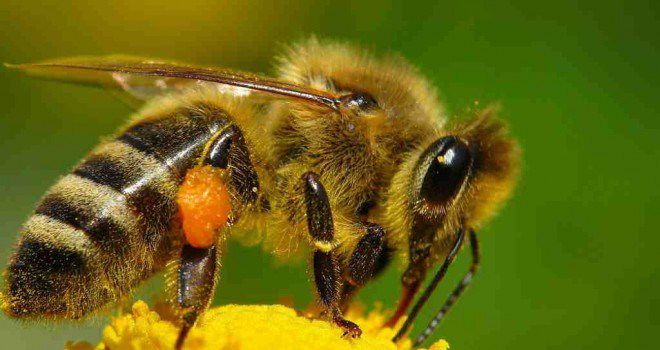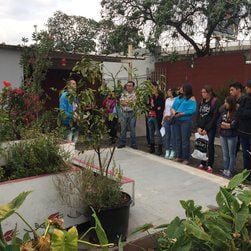
What would you do if one day your favorite fruit disappears and no matter how eager you are to try it again it is not possible? Then there are no more flowers, you can't smell or feel the sunflower, the dandelion, the lavender again; suddenly you don't see butterflies, birds, or the animals you commonly saw on your daily journey. Although this sounds like science fiction, it is a reality that could happen because of the current threat to bees and other pollinators, and that is that as a human species we depend on these small insects.
Gerardo Ceballos, researcher at the Institute of Ecology of the UNAM, tells Infobae Mexico that if bees are lost, the ability to produce food. In his words: “With the extinction of bees, and the extinction of species in general, we are in such a complicated situation that what happens in the next 15 years will determine what happens to humanity and life on Earth.”
The researcher mentions that bees are one of the indicators of how the planet is located. According to Ceballos, losing so many bees and that they are going extinct indicates that we are in serious trouble: “It's a wake-up call that after the bees other animals follow and then others.”
On the planet there are at least 20 thousand species of bees. The bee we commonly know is the apis mellifera; however, it is not endemic to Mexico since it comes from Europe. The work done by bees, and pollinators in general, is extremely important for the ecosystem and for human nutrition. This process depends on 90 percent of flowering plants such as sunflowers, marjoram, borage; 75 percent of the world's food crops such as tomato, avocado, pumpkin, all of which are important in the Mexican diet and 35 percent of agricultural land, according to the UN.
In Mexico there are approximately 2 thousand species of bees. Some of them are solitary, 47 produce honey and are melipona bees, that is, they have no sting. The Mayan peoples have been cultivating them for hundreds of years and call it “sacred bee” because of the healing properties of their honey. Due to various factors, bees are at serious risk of extinction. It is important to mention that the European species has many hives on beekeeping farms all over the world; however, the country's wild species are those that are threatened.

Elizabeth Bacilio, a veterinary doctor specializing in bees, currently works in the Commission on Natural Resources and Rural Development of the Ministry of the Environment, and is also a beekeeper and trainer in this trade. Bacilio explains to Infobae Mexico that the decline in these insects is a set of several factors: “Parasitic and viral diseases, the use of insecticides and pesticides, climate change, poor management of farmers, urban stain, as well as the use of signal antennas help the bees cannot return to their hive because they are lost.” That is, the antennas that are needed to be able to use our cell phones today are responsible for the loss of many bees.
One of the problems, he says, is that in many places where there is sowing, farmers clean the land, that is, they uproot the weeds; but within it are wild sunflower, white clover, dandelion, campanita vines. Honey and pollen are obtained from all these weeds, and when they are removed, food is taken away from the bees and other pollinators, causing them to die. He mentions that “these bees are the ones that are in danger of extinction. People have no idea that these bees exist because they are not very observant, they don't have that patience to have a garden and take care of it.”
Even many people demonize bats, but they are also important pollinators. For example, if bats run out, there would no longer be mezcal because they are exclusive pollinators of this type of maguey where the drink is taken out.
Undoubtedly, one of the main problems surrounding bees that is urgently needed to eradicate, according to specialists, is the use of pesticides and insecticides. Ceballos mentions that they should be banned because they contain residues that kill bees, and that two or three large companies should be forced to stop producing these chemicals.
To this, Bacilio adds that companies of this magnitude already have various demands because they are products that have neonicotinoids, which are carcinogenic according to the World Health Organization. Even people who handle this type of product have fallen ill: “it goes beyond the death of pollinators, human health goes hand in hand,” he says.
Associations such as Greenpeace have proposed banning toxic pesticides such as neonicotinoids, fipronil and other insecticides.

Aurora Xolalpa, professor and researcher at the Mayan Intercultural University of Quintana Roo and head of the Innovation Center for Sustainable Beekeeping Development, tells Infobae Mexico that the use of pesticides is an issue that has not been stopped and that it is almost impossible to stop.
“We had a case four years ago in the municipality where I am, there were just over 300 colonies damaged, many of them dead, others died slowly and others abruptly; it was a single product that practically poisoned a lot of bees and there was no legal response from the government,” he says. It also says that last January, 430 colonies were damaged by the same problem and to this day there has not been an institution that stops in the area to respond, despite the fact that a complaint was filed with the Public Prosecutor's Office.
According to Xolalpa, the priority issues that we should be addressing are chemicals due to the high mortality that there are, there are no legal bases to respond to this type of crime when people put them, there is no correct regulation of these products and the farmer does not know what they are using, they do not use one protection to apply them, more in the south. He also states that there are areas in Campeche where there are very frequent aerial applications and farmers do not know when the chemical will fall on their heads.

In Mexico City, pollinating gardens have been implemented in urban centers promoted by the director of FES Iztacala María del Coro Arizmendi. In them, a space with specific plants is planted to attract pollinating animals such as bees, bumblebees and hummingbirds to provide them with food resources in a city where their natural habitat has deteriorated and there are few green areas.
Elizabeth Bacilio explains that we can implement in our gardens pots that are hung on the wall or, if you have a balcony, she recommends that they be aromatic plants such as mint, rosemary, which although they don't seem to have tiny flowers. If you have a larger space, he adds, you can plant fruit trees or vines, where these insects can also be appreciated, as well as leave containers of water in the garden with marbles, stones or twigs so that the bees do not drown and can take it.
If we get to see a swarm, it's important not to call the fire department to exterminate it. There is a swarm relocation process that can be carried out with different beekeepers, but it comes at a cost. That's when people don't want to do it, but it's necessary to think that the beekeeper has expenses such as per diem or the suit, says Bacilio
On an individual level, Aurora Xolalpa mentions that the most important thing is to keep us informed, to know the importance of her work and how it contributes to feeding human beings. Pollinating gardens are very valuable, but wanting to help this problem has to go beyond putting beautiful plants, we have to inform ourselves to know if the pollen of those plants feeds and nourishes bees. In addition to reducing chemicals to the maximum at home, separating organic from inorganic and organic to give it a new use.
According to Xolalpa, he says that “thinking about benefiting bees by putting a flower on them or giving them water with sugar is not enough.” It is important to mention that, despite the efforts made as individuals, the cycle is infinite if there are no regulations and laws that prohibit the use of chemicals that affect both pollinating animals and humans themselves.

Aurora concludes that every time we eat a spoonful of honey we are eating thousands of flowers, thousands of bacteria and thousands of beneficial enzymes “because honey is not just a sweetener, it is a perfect blend of life; bees carry life on their legs. Taking care of bees is taking care of you.”
KEEP READING:
Últimas Noticias
Debanhi Escobar: they secured the motel where she was found lifeless in a cistern
Members of the Specialized Prosecutor's Office in Nuevo León secured the Nueva Castilla Motel as part of the investigations into the case

The oldest person in the world died at the age of 119
Kane Tanaka lived in Japan. She was born six months earlier than George Orwell, the same year that the Wright brothers first flew, and Marie Curie became the first woman to win a Nobel Prize

Macabre find in CDMX: they left a body bagged and tied in a taxi
The body was left in the back seats of the car. It was covered with black bags and tied with industrial tape
The eagles of America will face Manchester City in a duel of legends. Here are the details
The top Mexican football champion will play a match with Pep Guardiola's squad in the Lone Star Cup

Why is it good to bring dogs out to know the world when they are puppies
A so-called protection against the spread of diseases threatens the integral development of dogs




